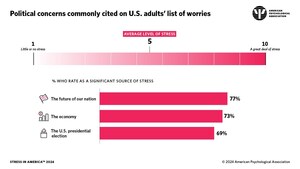2020 Presidential Election A Source Of Significant Stress For More Americans Than 2016 Presidential Race
American Psychological Association offers advice on how to handle election stress
WASHINGTON, Oct. 7, 2020 /PRNewswire/ -- Ahead of the most divisive election in decades, more than two-thirds of U.S. adults (68%) say that the 2020 U.S. presidential election is a significant source of stress in their life, a large increase from the 2016 presidential election when 52% said the same, according to a new survey conducted by The Harris Poll on behalf of the American Psychological Association. The survey also found that regardless of political affiliation, majorities say that the election is a significant source of stress (76% of Democrats, 67% of Republicans and 64% of Independents).
Even though the majority of Americans say the election is a source of stress, the survey found that for some groups, stress about the election is significantly higher compared with 2016. The proportion of Black adults reporting the election as a source of stress jumped from 46% in 2016 to 71% this year.
As health care issues continue to dominate the news, the survey found that adults with a chronic condition are consistently more likely than those who do not have a chronic condition to report the election as a source of stress in their life (55% vs. 45% in 2016 and 71% vs. 64% in 2020). However, in 2020, people with a chronic condition are significantly more likely to say the election is a very significant source of stress for them (39% vs. 28%). In 2016 this response yielded no significant difference (20% vs. 17%).
In 2020, more than three-quarters of Americans (77%) say the future of our nation is a significant source of stress, up from 66% in 2019. Likewise, the current political climate is reported as a significant source of stress by more than two-thirds of Americans (68%), compared with 62% who said the same in 2019.
"This has been a year unlike any other in living memory," said Arthur C. Evans Jr., PhD, APA's chief executive officer. "Not only are we in the midst of a global pandemic that has killed more than 200,000 Americans, but we are also facing increasing division and hostility in the presidential election. Add to that racial turmoil in our cities, the unsteady economy and climate change that has fueled widespread wildfires and other natural disasters. The result is an accumulation of stressors that are taking a physical and emotional toll on Americans."
APA offered the following evidence-based advice to help people manage their stress related to the election:
- Uncertainty is frequently stressful, and some people are better at dealing with uncertainty than others. The election, the global pandemic and social unrest are all adding to a sense of uncertainty in our lives. Avoid dwelling on things you can't control. When uncertainty strikes, many people immediately imagine worst-case scenarios. Break the habit of ruminating on bad outcomes.
- Focus on what you can control. If following the news, watching the debates or scrolling through social media is causing you stress, limit your media consumption. Give yourself permission to take a break from the news.
- Engage in meaningful activities. Rather than fixating on news coverage, find an activity that you really enjoy and spend time doing it. Get involved in issues that are meaningful to you. By making a plan on how you will vote, for example — in person, by mail or as part of early voting — you are more likely to follow through.
- Stay socially connected. Go for a walk or spend time with friends and family. Research shows that people who have at least one or two friends or family members to turn to for emotional support during stressful times tend to cope better than people who don't have such support.
- Stay active. Moving helps us release the energy we experience when we feel stressed.
- Realize that we might not know who won the election on Election Day. If you think this will raise your anxiety, keep busy with things that you enjoy and stay connected to social support so that you aren't continually checking for what could be viewed as "bad" news.
More information about managing stress and infographics on the findings are available at www.stressinamerica.org.
Methodology
This survey was conducted online within the United States by The Harris Poll on behalf of the American Psychological Association between Aug. 4 and Aug. 26, 2020, among 3,409 adults age 18+ who reside in the U.S. Interviews were conducted in English and Spanish. Data were weighted to reflect their proportions in the population based on the March 2019 Current Population Survey by the U.S. Census Bureau. Weighting variables included age by gender, race/ethnicity, education, region, household income and time spent online. Hispanic adults also were weighted for acculturation, taking into account respondents' household language as well as their ability to read and speak in English and Spanish. Country of origin (U.S./non-U.S.) also was included for Hispanic and Asian subgroups. Weighting variables for Gen Z adults (ages 18 to 23) included education, age by gender, race/ethnicity, region, household income and size of household. Propensity score weighting was used to adjust for respondents' propensity to be online. A propensity score allows researchers to adjust for attitudinal and behavioral differences between those who are online versus those who are not, those who join online panels versus those who do not, and those who responded to this survey versus those who did not. Because the sample is based on those who were invited and agreed to participate in research panels, no estimates of theoretical sampling error can be calculated.
SOURCE American Psychological Association

WANT YOUR COMPANY'S NEWS FEATURED ON PRNEWSWIRE.COM?
Newsrooms &
Influencers
Digital Media
Outlets
Journalists
Opted In






Share this article